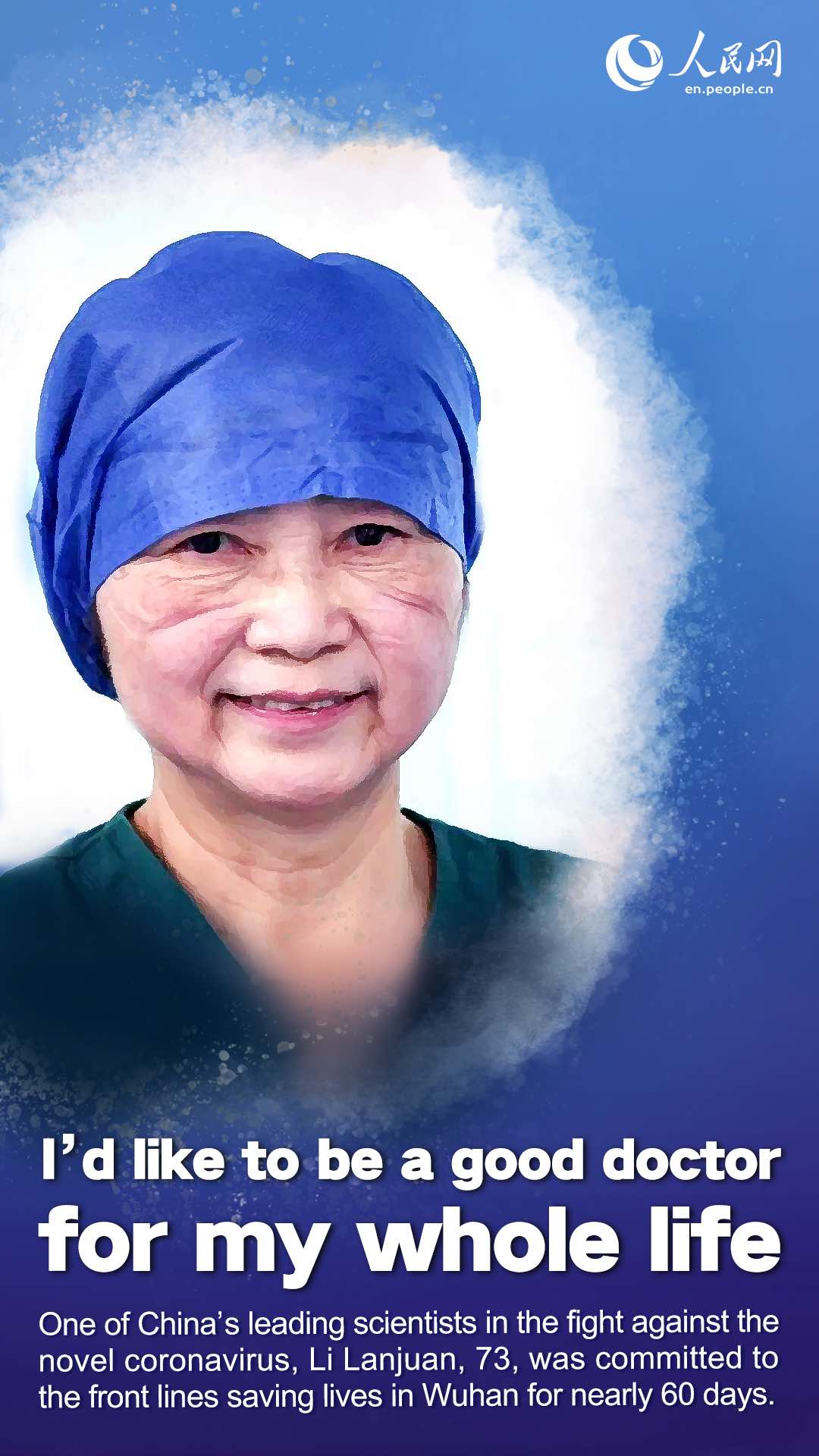From barefoot doctor to heroine: 73-year-old Li Lanjuan saves lives on the front line
date:2020-04-27 10:01:36 hits:
You in others-this is your soul. This is what you are. This is what your consciousness has breathed and lived on and enjoyed throughout your life-your soul, your immortality, your life in others.
——Boris Pasternak, Doctor Zhivago


After nearly two months of unswerving efforts on the front line, academician Li Lanjuan left Wuhan on the last day of March. As she entered the departure hall of Wuhan airport, other medics lined up to salute her, chanting “Goddess” in unison.
Li Lanjuan is a renowned epidemiologist and one of China's leading scientists in the fight against the novel coronavirus. At the age of 73, she committed herself to working on the front lines, saving lives in the epicenter of the outbreak.
Li Lanjuan (C) entered the departure hall of Wuhan airport on March 31. (Photo/Chinanews.com)
“For two months, we have been engaged in the thrilling battle against the coronavirus, and we have made wonderful achievements in the initial stage," Li said.
After more than two months of lockdown, transportation into and out of Wuhan will resume on April 8. While Li is delighted that their efforts have paid off, she still remembers how severe the crisis was in the city when she arrived two months ago.
Race against time
On February 1, ten days after the city had been put in lockdown, Li and her team arrived in Wuhan to lend the city their support. She knew that a tough challenge was waiting for her.
“To be honest, I was a little bit afraid. As an infectious disease specialist, I knew there were risks, but it’s our duty to go to the front line,” she said.
Li Lanjuan (L) works in the intensive care unit ( ICU) of Hubei General Hospital. (Photo/Chinanews.com)
Li went directly to Hubei General Hospital, which mainly treated critically ill coronavirus patients. Even though she has been through epidemics before, such as SARS and H7N9, she was still shocked to see how dire the situation was there, which put her under great psychological pressure.
"Shortly after we arrived, the hospital had already received 400 critically ill patients. That number doubled after a couple of days."
While in Wuhan, Li had a very heavy schedule and was only able to sleep three to four hours a day. This intense workload would be a huge challenge for anyone, let alone a 73-year-old. But she said, “The purpose of my coming here is to save the lives of patients and reduce the fatality rate, so that society will no longer be in a state of panic.”
Four days after arriving, Li’s team made a breakthrough in its research into the virus. Their preliminary tests showed that two antiretroviral medications, Arbidol and Darunavir, could effectively inhibit replication of the new strain. Several days later, the artificial liver support system developed by Li’s team proved to be effective in treating coronavirus patients.
Becoming a national heroine
In 1970, Li was recommended by her township to study at Zhejiang Medical University.
Li was born into a poor peasant family in eastern China’s Zhejiang province. She previously worked as a barefoot doctor in her village earning a low salary, offering medical treatment for local villagers. In 1970, Li was recommended by her township to study at Zhejiang Medical University. After graduating, she began her career in epidemiology.
In the 1980s, severe hepatitis was raging across the country with a fatality rate of up to 80%. Li was determined to rise to this medical challenge and save lives. After years of relentless efforts, in 1996, Li and her team developed an artificial liver support system which significantly improved survival rates for people with severe chronic hepatitis.
During the SARS outbreak in 2003, Li led disease prevention efforts in Zhejiang. She proposed quickly isolating over 1,000 suspected cases, which prevented medical staff in the province from getting infected and prevented second-infection in the province.
During the 2013 avian flu outbreak, Li's team quickly isolated the H7N9 strain as the pathogen and developed the vaccine seed-strain in two months, successfully preventing the disease from spreading to the rest of China.
Continuing success
Li Lanjuan poses for a photo before entering the locker room of Hubei General Hospital. (Photo/Chinanews.com)
Li’s legendary achievements continued during the most testing period of the coronavirus outbreak. Her team used the successful experience they had gained in the treatment of H7N9 patients, while artificial liver technology also played a major role.
On March 18, Wuhan hit a milestone, reporting zero new confirmed or suspected cases of the coronavirus. Li believes that there is light at the end of the tunnel and the crisis will definitely be overcome.
“This city of Wuhan is a heroic city. In such a difficult time, all people are working together in unison, and after the lockdown, everything was in order and everyone contributed to controlling the epidemic,” Li said.
An image of Li Lanjuan's face left with deep wrinkles from wearing tight masks circulated all over the web. (Photo/Chinanews.com)
Li’s great contributions to the fight against coronavirus have won praise and respect from many Chinese people. Recently, an image of her face left with deep wrinkles from wearing tight masks circulated all over the web. Many netizens took to nicknaming her “Grandma Li”, expressing their admiration and thanking her for her hard work on the front line.
Li has now returned to her hometown, but her battle against the virus is not over. She said her efforts would now be focused on continuing the research into the coronavirus and accelerating the development of a vaccine.
In Li’s eyes, her biggest joy comes from being able to cure as many patients as she can. “I’d like to be a good doctor for my whole life.”
